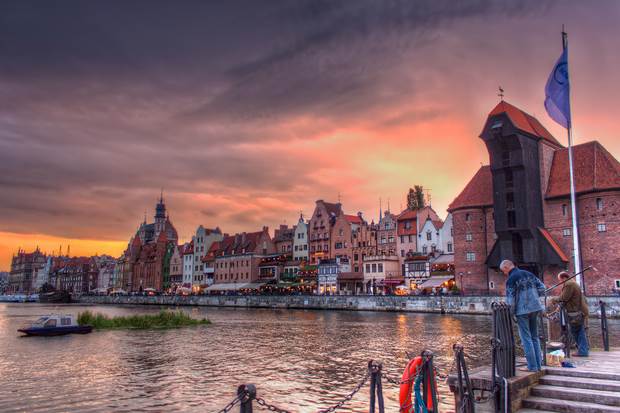I recently had the pleasure of visiting Gdańsk, a Polish city on the Baltic coast where I spoke at an event hosted by GetResponse, an email marketing startup, and Brand24. I was joined by John Rampton and Murray Newlands, two California-based influencers and the founders of digital payment platform Due.
We spoke to a curious audience of top tech and marketing talent from all corners of Poland and were impressed by the enthusiasm we encountered.
VC money? No thanks.
Poland is home to companies that have grown into major players in their respective fields. Chat software LiveChat, webinar and video conferencing platform ClickMeeting — founded and led by Simon Grabowski, CEO and founder of GetResponse — social learning network Brainly, IoT startups Estimote and Kontakt.io, presentation software Prezi and others are slowly putting the country on the map and into the consciousness of global tech audiences.
What sets many Polish companies apart from their competitors in the US and Western Europe, is their insistence on staying bootstrapped, until a possible IPO, as was the case with LiveChat. According to Grabowski, GetResponse — a company he founded in the mid ’90s — has been profitable from the very beginning and the strategy has been to stay independent without external pressures, especially from outside investors.
“They always have an exit strategy. I don’t. So it always baffles me when people ask me what mine is.”
Mateusz Kurleto, a local tech entrepreneur and founder of two companies, Neoteric and AmberHub, believes that because of the relatively large size of the local market (Poland has a population of 38.5 million) companies can grow quite big, although for many, such as GetResponse LiveChat, the audience is mostly global.
While self-sufficiency might be a choice for many, it’s also a necessity.
“There is little investment culture in Poland; even old school businesses were being bootstrapped in many cases in the 80s and 90s. For example. CCC (shoe producer and retailer with almost 800 stores in 16 countries) started by selling t-shirts in the flea market. There is also low access to money, not too many angels and VCs are often dependent on EU funds and other grants,” Kurleto said.
Different realities
After speaking with local entrepreneurs like Kurleto, one reason preventing final breakthrough for local companies seems to be EU funding, which seems to be doing more harm than good. Some complain that it is too easy to get EU grants and many companies fail to show much for the funds received. It’s perhaps a typical example of good intentions gone astray. When money is easy to get and comes with few conditions, the end-result might not be a multinational company.
What’s more, for local companies competing for customer on a global scale, the problem is also the financial imbalance of global ecosystems. American and Polish companies might be competing for the same audiences, but their resources are not.
“In the US we could raise $2M+ just to create a prototype and just by showing the proof of concept. Here; we were happy to raise $250k — enough to make a prototype, but not enough to test a global go-to-market strategy,” Kurleto lamented.
While Polish companies have access to money, it’s not available throughout the entire lifecycle of a growth company. Many startups fail when the funding runs out at a crucial moment, usually when they are expected to scale.
“In pre-seed and seed stages, it’s (getting funding) pretty easy. Over the last few years we’ve had a decent amount of funds. Later stages (early-growth and growth) are definitely more challenging,’ said Jan Zajac, the CEO of Warsaw and London based Sotrender, a social media analytics tool.
Michal Borkowski, the CEO of Brainly, adds the experience-factor to the litany of reasons hindering the success of local companies.
“The experience that the Polish startups have in terms of business and product is an issue. When you benchmark the local VCs here with their western equivalents, they seem small. An average Polish VC can manage $10M, in the US they’d be considered a micro VC.”
Borkowski believes that the interest of global investors in Polish companies may be lowered by the awareness of a bigger legal risk.
“If the main legal entity is in Poland it creates many problematic issues that need to be solved when you find an investor from abroad. What startups here do is they often open a flip entity in the US, which while being more costly can facilitate the process for the foreign investors.”
However, Borkowski remains optimistic.
“There are more and more local business angels, people who can help you with their experience and back your business financially. We already see examples of people who build successful brands and exit. In many cases they reinvest the money which builds on the ecosystem. Of course this requires time, but Poland is on a good way to have a healthy VC market.”
Kurleto makes an interesting point about maturity. When Polish companies have not had exits, when there’s no “trickle down” effect in the workforce, it is a challenge for the ecosystem to expand.
“We need people that helped first serious startups succeed to found new ones or to join new ones; have first employees from LiveChat join Appoint.ly, first new business managers from GetResponse join SaaSManager. This rarely happens as those startups can afford paying market salaries and new ones can’t which means that there are no experienced individuals left to lead new startups.”
Indeed, the likelihood of a GetResponse employee being poached by a local company is extremely low and more important, the incentive for these employees to seek employment elsewhere is even more unlikely.
Comparing the potential of Poland to Estonia’s experience with Skype and Finland’s with Nokia — both once motors of the local economies and talent magnets — Poland, too, needs a company that grows big and becomes an incubator for engineers and tech leaders who then go on to become founders, CTOs and CEOs of new companies and as a result help create a sustainable startup ecosystem in Poland.
This article is published as part of the IDG Contributor Network. Want to Join?





![[Video] Reimagined for Orchestra, ‘Over the Horizon 2026’](https://loginby.com/itnews/wp-content/uploads/2026/02/Video-Reimagined-for-Orchestra-‘Over-the-Horizon-2026’-100x75.jpg)

